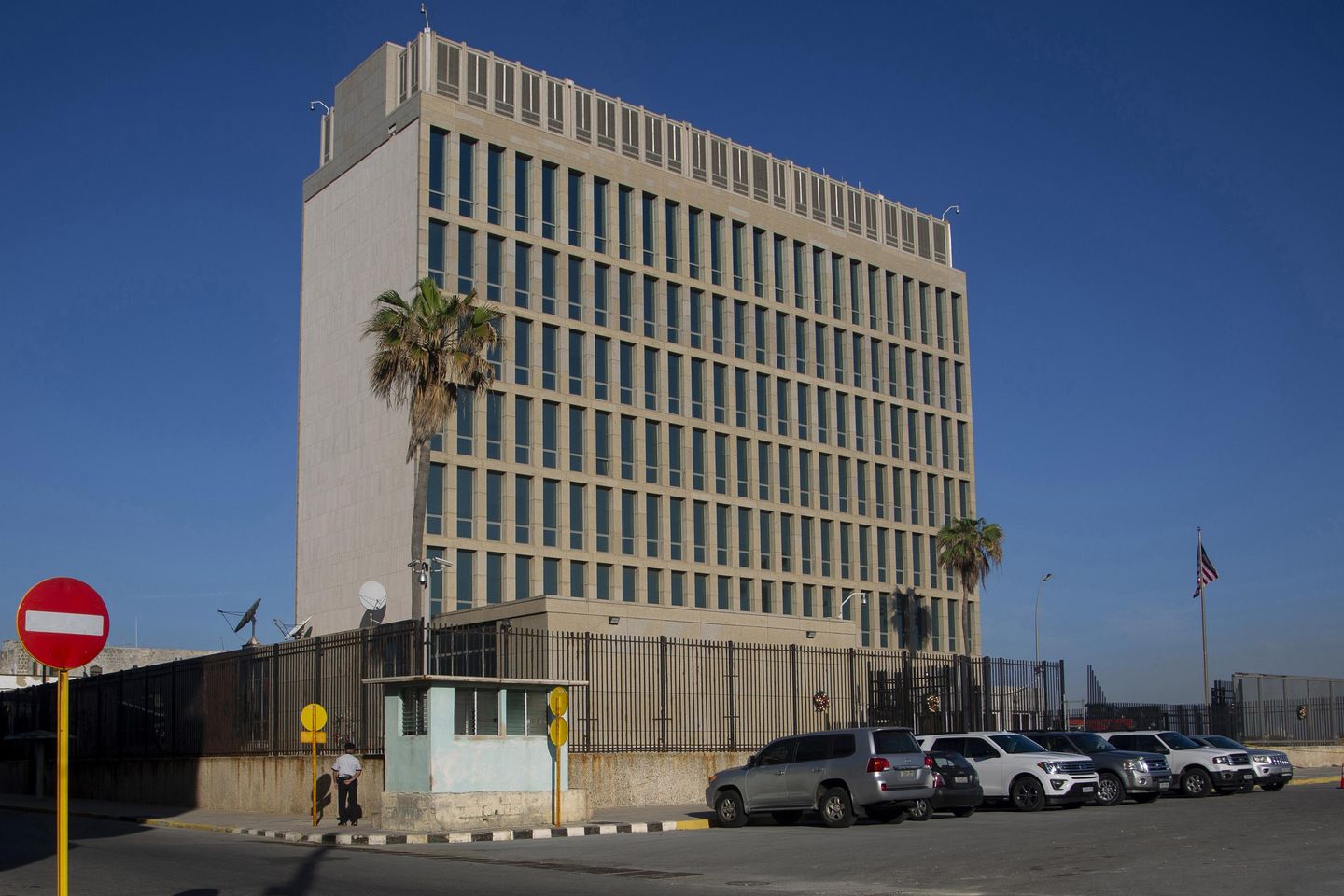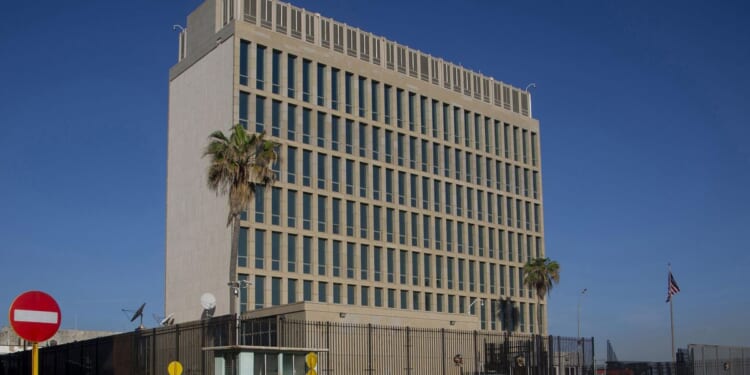
NEWS AND ANALYSIS:
New probe ties Russia to Havana Syndrome attacks
U.S. intelligence agencies increasingly are under fire for downplaying what a recent media investigation contended was Russia’s covert use of a new type of beam weapon that inflicted brain injuries on scores of American diplomats and intelligence officials.
As reported by Inside the Ring last week, the Office of Director of National Intelligence stated in its annual threat assessment last month that most U.S. spy agencies concluded “it is very unlikely a foreign adversary is responsible” for the brain injuries and other mysterious symptoms suffered by U.S. officials and dubbed the “Havana Syndrome.”
Greg Edgreen, a retired Army lieutenant colonel who investigated the syndrome for the Defense Intelligence Agency, said in a report broadcast Sunday that he believes Russia is behind what appear to be acoustic or microwave attacks. Asked if the incidents government investigators have dubbed “anomalous health incidents” were the result of enemy attacks, Mr. Edgreen said: “My personal opinion [is] yes.” Who? “Russia,” he said.
Mr. Edgreen provided new information contradicting the official U.S. intelligence conclusion that no foreign adversaries are behind the incidents. His comments came during an in-depth investigative report broadcast Sunday by CBS’s “60 Minutes,” which worked together with the German news outlet Der Spiegel and an opposition Russian news outlet called The Insider.
According to Mr. Edgreen, the Pentagon gathered a large amount of information on the brain attacks, including signals intelligence, intelligence from human spies, and open-source data from the internet and from travel and financial records.
“Unfortunately, I can’t get into specifics, based on the classification. But I can tell you at a very early stage, I started to focus on Moscow,” he said.
Mr. Edgreen said one key indicator involved the targeted officials, whom he described as in the top 5% of DIA officials. The targeted officials were all linked to a “Russia nexus” and who were disabled and rendered ineffective after the attacks.
The Sunday broadcast report said the most likely source of the attacks are directed pulsed radio frequency energy, microwaves or acoustic ultrasound.
U.S. intelligence analysts, by contrast, have attributed the attacks to either environmental factors or personal medical conditions – claims that have angered many of those suffering from the episodes.
The CBS report included an interview with an FBI agent identified only as “Carrie” who described being attacked by some type of external force. Two brain attacks she suffered took place after what the report said was her role in a counterintelligence probe of a suspected Russian spy in Florida.
Robert McCreight, a retired national security specialist and former Army special operations officer, said the “60 Minutes” report marked a good first step, providing data that counters the official view of a non-adversary origin for Havana Syndrome.
But he said the broadcast report failed to examine other potential sources for the attacks. Notably, the Chinese military has publicly disclosed its push to develop sonic and electronic brain-affecting beam weapons.
Mr. McCreight, after extensive research into the brain attacks, said China is also a likely suspect behind the incidents.
Havana Syndrome was first detected at the U.S. Embassy in Cuba in 2016. Another group of similar brain injuries were suffered by U.S. government personnel in Guangzhou, China.
Mr. McCreight says that both attacks as the result of what he calls “neurostrike” weapons.
Research indicates both Russia and China are engaged the brain attacks using “a convergent cocktail of technologies,” including nano-pulsed radio frequency, ultrasound, embedded absorbed nanotech, cyber platforms and other advanced technologies.
Microwave weaponry as a source is unlikely, but not entirely ruled out, he told Inside the Ring.
The Kremlin this week dismissed the “60 Minutes” report as old conspiracy theories lacking any real proof.
“No one has ever published or expressed any convincing evidence of these unfounded accusations anywhere,” Russian government spokesman Dmitry Peskov told reporters. “Therefore, all this is nothing more than baseless, unfounded accusations by the media.”
The Pentagon is working on sensors capable of detecting attacks that produce what it calls “unconventionally acquired brain injuries.”
A spokesman for the ODNI said U.S. intelligence agencies continue to investigate the incidents, but repeated the office’s finding from the threat assessment that foreign adversary involvement is “very unlikely.”
A government source familiar with the White House policy on Havana Syndrome said one person thought to be impeding investigations into foreign adversaries’ roles in the incidents is Meher Bitar, the National Security Council intelligence director.
An administration official strongly denied Mr. Bitar is blocking inquiries that enemy action may have caused the incidents. “It’s just not true,” the official said, adding that the White House has left it up to intelligence agencies to conduct independent investigations of the matter.
In a statement on the “60 Minutes” report, the White House said federal agencies were directed by the administration to “prioritize” investigations into “potential causes” of the brain incidents.
Biden again tells Xi U.S. accepts communist system
President Biden this week repeated his assertion to Chinese President Xi Jinping that the United States is not seeking to undermine China’s communist system.
Mr. Biden held his first phone call with the Chinese leader since 2022 on Tuesday to discuss bilateral relations and global hot spots and problems. The two also met in person last fall at a Pacific Rim summit in California.
The White House in a statement called the discussion “candid and constructive” – diplomatic jargon for difficult and potentially hopeful. There was little elaboration on how the call was constructive.
Differences between the two leaders, however, were spelled out in U.S. concerns about Chinese military coercion against Taiwan and Philippines, and complaints from Mr. Xi about U.S. trade and economic policies.
The White House readout, however, did not disclose Mr. Biden’s promise not to undermine the communist system, a detail that was contained in the Chinese Foreign Ministry’s summary of the call.
“President Biden reiterated that the United States does not seek a new Cold War, its objective is not to change China’s system, its alliances are not targeted against China, the U.S. does not support ‘Taiwan independence,’ and the U.S. does not seek conflict with China,” the ministry quoted the president as saying.
Mr. Biden and top aides such as Secretary of State Anthony Blinken have stated on several occasions in the past that U.S. policy toward China is to seek to compete with Beijing in all areas except ideology. The approach is said to reflect the growing influence of pro-Marxist officials within the Biden administration, analysts say.
The Chinese Communist Party has announced that its authoritarian system will eventually replace the U.S.-led system supporting democratic rule and open markets.
In its propaganda organs, the party frequently accuses the CIA of seeking to overthrow the Marxist-Leninist system in China that has been in place since 1949 and that studies have said has caused tens of millions of deaths through government social-engineering policies.
Since coming to power in 2013, Mr. Xi refocused the party on both the study and practice of communist ideology. For example, all 98 million Communist Party members inside China are required to study Marxist concepts such as dialectical materialism and historical materialism.
China backing Hamas, analyst says
The war between Israel and Hamas has revealed extensive Chinese support for Hamas and other Palestinian militant groups that the U.S. and Israel consider terrorist organizations, according to strategic analyst Guermantes Lailari.
Mr. Lailari, in a report published by the Jewish Policy Center, notes that Israeli Defense Forces uncovered large caches of Chinese-made weapons, intelligence-gathering gear and other military supplies during raids in Gaza.
“The IDF found Chinese military equipment in Hamas warehouses, including large numbers of assault rifles (QBZ assault rifles) and grenade launchers (QLZ87 automatic grenade launchers), telescopic sights for rifles and cartridges for M16s, high-end communications equipment, listening devices, tactical military radios and sophisticated explosives,” he stated.
Chinese rocket technology also was found in a Hamas weapons laboratory.
China in January denied providing Hamas with military equipment, although Mr. Lailari notes that extensive Chinese military backing for Iran is a likely source of the arms.
“Even if the Chinese military supplies discovered in Gaza were provided by Iran, [Chinese] officials knew that Iran forwarded equipment to Hamas,” he stated. “Certainly, Iran provided funding and training to use the equipment.”
Chinese military technology also has been found in missiles used by other anti-Israel Iran-backed regional groups such as Lebanon’s Hezbollah, the Houthis in Yemen and Iraqi Shiite militia groups, he said.
Mr. Lailari, a retired Air Force foreign area officer, noted that Mohammed Deif, the Hamas military wing leader who is suspected of orchestrating the October 7 terror attack on Israel, received training in China.
In 1996, Mr. Deif was sent by the Palestine Liberation Organization to China where he studied artillery and rocketry at the People’s Liberation Army’s General Armament Department Ordnance Engineering College in Shijiazhuang, Hebei Province.
“During his time there, he married two Chinese Muslim women from Sarta or Dongxiang ethnicity in Gansu (China) and brought them to Gaza in 2000 after he completed his studies,” said Mr. Lailari, a visiting scholar at Taiwan’s National Chengchi University.
“Reports indicate that one of the Chinese wives opened a channel to the Chinese Communist Party leadership to maintain CCP and Hamas communications.”
• Contact Bill Gertz on X at @BillGertz.












